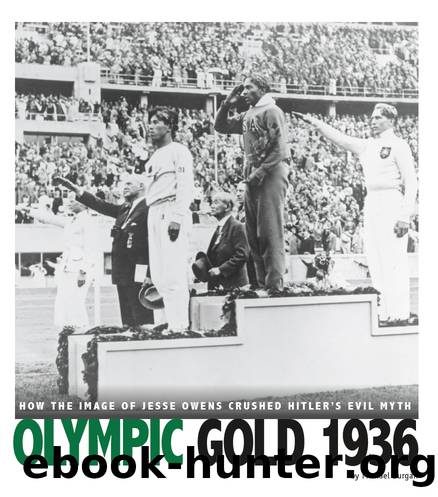Olympic Gold 1936 by Michael Burgan

Author:Michael Burgan [Burgan, Michael]
Language: eng
Format: epub
Tags: 978-0-7565-5528-3; 978-0-7565-5532-0; Olympics; Jesse Owens; racism; Nazis; Hitler; 1936; Germany; Leni Riefenstahl; photography; filmmaking
Publisher: Capstone
Published: 2019-11-12T00:00:00+00:00
The second part of Olympia was titled Festival of Beauty and included aquatic events.
In keeping with Goebbelsâ aims, Riefenstahl did not make Olympia pure propaganda for the Nazis. That was clear in her footage of the long-jump competition between Owens and Long. But by including the event and others involving black Americans, she defied Goebbels. He had not wanted her to show them at all. But Riefenstahl kept Owens in, and the long jump became a highlight of the first part of Olympia. Her positive treatment of him led Germans to create a little rhyme: âLeni shows the Führer too / all that German film can do / He saw in negative print / how positive the Negro could sprint.â26
The day after Owensâ record-setting long jump, he raced in the 200-meter finals. The race took place on a curved part of the stadium track, not on a straightaway. Owensâ time of 20.7 seconds won him another gold medal and set a record for the event on a curved track.
Most Americans probably assumed the Olympics were then over for Owens. Newspapers reported that he would not be one of the runners in the 400-meter relay. For that event, each athlete carries a baton for 100 meters, then passes the baton to the next runner on his team. As The New York Times reported August 5, âLawson Robertson, track coach, feels the Ohio State Negro has done just about enough in one Olympics.â27 At that time, the paper said, Robertson wasnât sure who his four runners would be, but the likely candidates were Marty Glickman, Sam Stoller, Foy Draper, and Frank Wykoff.
To the surprise of many, when it came time for the 400-meter relay, Owens was on the track. Robertson had chosen him and another fast African-American sprinter, Ralph Metcalfe. Hearing that Glickman and Stoller were out, Owens supposedly said, âIâve already got three gold medals, I donât need any more.â28 But over the previous few days, he had also told reporters he wouldnât mind a shot at a fourth medal. And he and his teammates did win the gold. As the largest crowd of the Olympics watched Owensâ last performance of the games, the Americans won with a world-record time of 39.8 seconds.
Many people had called the Berlin Olympics the âNazi Games.â And the Germans had done well, winning the most medals and the most gold medals. The United States placed second in each category. But Marty Glickman saw it differently. Years later, he said, âI saw that they were Jesse Owens Olympic Games. The myth of Nazi Aryan supremacy was smashed to smithereens by the great non-Aryan athletes.â29
Download
This site does not store any files on its server. We only index and link to content provided by other sites. Please contact the content providers to delete copyright contents if any and email us, we'll remove relevant links or contents immediately.
| Baseball | Basketball |
| Camping | Cycling |
| Football | Gymnastics |
| Hockey | Martial Arts |
| Motor Sports | Olympics |
| Racket Sports | Soccer |
| Track & Field | Water Sports |
| Winter Sports |
Dangerous Girls by Haas Abigail(3042)
The Ring of Sky by Chris Bradford(2839)
Quidditch through the Ages by J. K. Rowling(2795)
Quidditch Through The Ages by J. K. Rowling(2765)
A Game Worth Watching by Samantha Gudger(2116)
The Crossover by Kwame Alexander(1935)
Molly's Surprise by Valerie Tripp(1849)
Mom, There's a Dinosaur in Beeson's Lake by Trudi Trueit(1814)
Becoming Kareem by Kareem Abdul-Jabbar(1780)
Romancing the Nerd by Leah Rae Miller(1684)
Travel Team by Lupica Mike(1653)
The Flip Side by Shawn Johnson(1557)
McElligot's Pool by Dr. Seuss(1552)
Whatever Life Throws at You by Julie Cross(1481)
When Pride Still Mattered by Maraniss David(1415)
Playing With the Boys by Liz Tigelaar(1403)
The Million Dollar Putt by Dan Gutman(1296)
Father Water, Mother Woods by Gary Paulsen(1278)
Ugly by Robert Hoge(1242)
